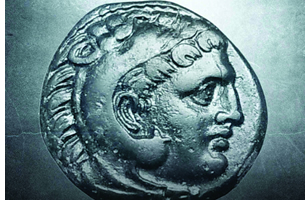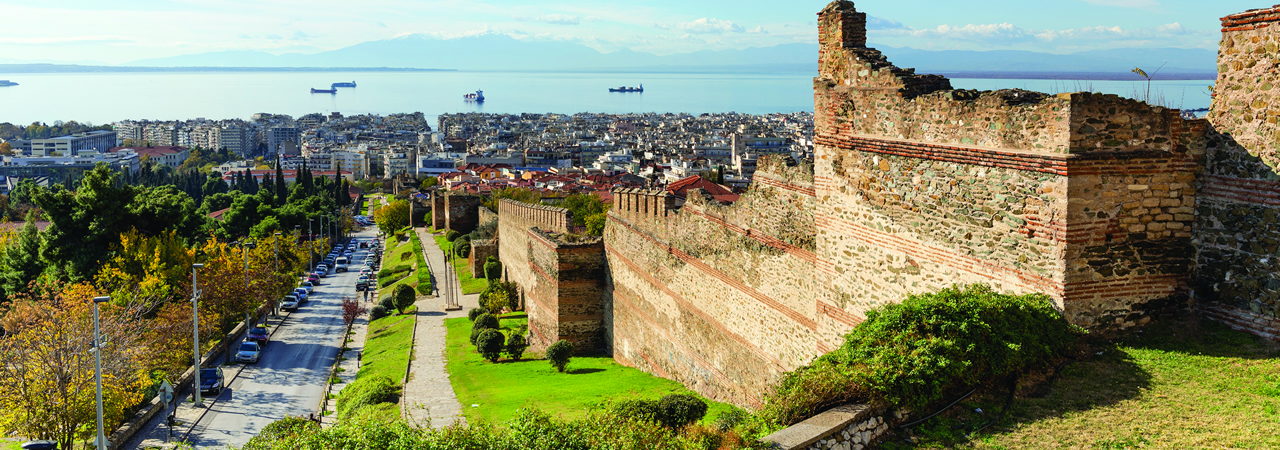The Message of 1 Thessalonians
What Paul initially wrote to the Thessalonians is also relevant to us today. A glimpse into a comforting and prophetic, apostolic letter.
The Apostle Paul wrote 1 Thessalonians to the church in Thessalonica in the Roman province of Macedonia (1:1; 2:18), and to all Christians (5:27), most likely from Corinth (Acts 18:5). Timothy came with a good report from Thessalonica to Corinth, where Paul was, which prompted him to write the letter (1 Thess 3:1-2). This was around 50 or 51 AD. Archaeology confirms that Gallio was governor of Achaia at the time. At that time, Macedonia was the northern province, and Achaia the southern (1 Thess 1:8). Gallio is mentioned in Acts 18:12. After Paul had come from Thessalonica to Corinth by way of Berea and Athens, he was confronted with Gallio. This letter is therefore one of the Apostle Paul’s first or oldest letters in the Bible (only Galatians may have been written a little earlier).
 Thessalonica served as the capital and most important port city of the province of Macedonia. The Macedonian king, Cassander, enlarged it in 315 BC by merging 26 smaller towns. He named it after his wife, Thessalonica, a half-sister of Alexander the Great. The city was highly prized by the Romans. As early as 42 BC, Caesar Augustus granted it free city status. The citizens thus had the right to self-governance. At the time of Acts, Thessalonica had about 200,000 inhabitants.
Thessalonica served as the capital and most important port city of the province of Macedonia. The Macedonian king, Cassander, enlarged it in 315 BC by merging 26 smaller towns. He named it after his wife, Thessalonica, a half-sister of Alexander the Great. The city was highly prized by the Romans. As early as 42 BC, Caesar Augustus granted it free city status. The citizens thus had the right to self-governance. At the time of Acts, Thessalonica had about 200,000 inhabitants.
It was located on one of the routes from Rome to the Orient, and had developed into an important trade city as a result. This also attracted Jewish merchants and their families, so that a synagogue was built on site in which Paul and Silas could preach the gospel.
In the first letter to the Thessalonians, Paul strengthens the believers in their faith, comforts them in persecution, expresses his solidarity with them, and gives them assurance of the Lord’s return.
Paul had founded the church along with Silas during his second missionary trip (Acts 15:36-41). After being arrested in Philippi and later released (Acts 16), they came to Thessalonica, where they founded the church in three weeks.
“Now when they had passed through Amphipolis and Apollonia, they came to Thessalonica, where was a synagogue of the Jews: And Paul, as his manner was, went in unto them, and three sabbath days reasoned with them out of the scriptures, Opening and alleging, that Christ must needs have suffered, and risen again from the dead; and that this Jesus, whom I preach unto you, is Christ. And some of them believed, and consorted with Paul and Silas; and of the devout Greeks a great multitude, and of the chief women not a few” (Acts 17:1-4).
It’s possible that Paul was in the area of Thessalonica for a little longer than three weeks, just not in the synagogue anymore. Paul indicates this when he writes to the Philippians: “For even in Thessalonica ye sent once and again unto my necessity” (Phil 4:16). It would be very unusual to receive financial support twice in just a three-week timespan. Additionally, Paul himself writes to the Thessalonians: “For ye remember, brethren, our labour and travail: for labouring night and day, because we would not be chargeable unto any of you, we preached unto you the gospel of God” (1 Thess 2:9).
The question arises of whether this kind of effort would have been necessary over three weeks. They clearly didn’t stay in Thessalonica for very long. During this time, Paul taught the Thessalonians the essentials of prophecy and God’s plan of salvation. And he was able to say, “For yourselves, brethren, know our entrance in unto you, that it was not in vain” (1 Thess 2:1).
The phrase “in vain” is remarkable. We also find it in other Bible passages: “But in vain do they worship me, teaching for doctrines the commandments of men” (Matt 15:9).—“But by the grace of God I am what I am: and his grace which was bestowed upon me was not in vain; but I laboured more abundantly than they all: yet not I, but the grace of God which was with me” (1 Cor 15:10).—“And if Christ be not risen, then is our preaching vain, and your faith is also vain” (v. 14).—“Therefore, my beloved brethren, be ye steadfast, unmoveable, always abounding in the work of the Lord, forasmuch as ye know that your labour is not in vain in the Lord” (v. 58).—“We then, as workers together with him, beseech you also that ye receive not the grace of God in vain” (2 Cor 6:1).—“I do not frustrate the grace of God: for if righteousness come by the law, then Christ is dead in vain” (Gal 2:21).—“I am afraid of you, lest I have bestowed upon you labour in vain” (Gal 4:11).—“Holding forth the word of life; that I may rejoice in the day of Christ, that I have not run in vain, neither laboured in vain” (Phil 2:16).
Like Paul, we should be careful that we’re not just shadowboxing. “I therefore so run, not as uncertainly; so fight I, not as one that beateth the air” (1 Cor 9:26). If we don’t want our work to be in vain, we must be careful to proclaim the full counsel of God—and this primarily includes the apostolic teachings. Anyone who makes the Gospels and the Old Testament the sole criterion for interpretation, without paying attention to the apostolic books as the highest and conclusive teaching of Jesus, is fundamentally wrong and is not promoting the church (cf. John 16:12-14).
So, we find that the entrance of Paul and his coworkers into Thessalonica wasn’t in vain. Why? What did they do it for? Luke emphasizes that Paul went into the synagogue and spoke to the Jews “out of the scriptures”: “And Paul, as his manner was, went in unto them, and three sabbath days reasoned with them out of the scriptures, Opening and alleging, that Christ must needs have suffered, and risen again from the dead; and that this Jesus, whom I preach unto you, is Christ” (Acts 17:2-3).
Paul used no introduction, no musical framing, no modern methods, tricks, or inventions, no special rhetoric. He didn’t speak about the newspaper, politics, or the Roman Empire, nor about social emergencies or nature conservation. He didn’t question the Scriptures, or even criticize them. He didn’t speak about Scripture, but from Scripture. And his theme was the suffering and resurrection of the Messiah: that He is the Christ (or King) of prophecy (Acts 17:3, 7; 2 Thess 2:5).
After a short time, the Jews in Thessalonica began to persecute the Christians, and Paul and Silas continued to Berea (Acts 17:5-11). The church was now on its own, and exposed to persecution and harassment very early on.
Because he had only been with them briefly, and because persecution arose, Paul was concerned about the young church of the Thessalonians. He sent Timothy there to comfort them. And when Timothy returned and reported on the Thessalonians’ testimony, Paul was, in turn, very comforted.
“Wherefore when we could no longer forbear, we thought it good to be left at Athens alone; And sent Timotheus, our brother, and minister of God, and our fellowlabourer in the gospel of Christ, to establish you, and to comfort you concerning your faith … But now when Timotheus came from you unto us, and brought us good tidings of your faith and charity, and that ye have good remembrance of us always, desiring greatly to see us, as we also to see you: Therefore, brethren, we were comforted over you in all our affliction and distress by your faith” (1 Thess 3:1-2, 6-7).
This young church lived an independent Christian life very early, without the accompaniment of a great pastor or preacher, and without the control of a human leader. This speaks of the effect of the Holy Spirit, who lives in every life that He has renewed. Paul therefore wrote the letter to tell the Thessalonians how the report of their radical change had comforted him. He also wrote to strengthen the church, answer their questions, and provide more instruction.
There was apparently a misunderstanding about Jesus’ return among the Thessalonians. There was confusion that beloved fellow Christians were dying, and the Lord had not yet returned. The question of what would happen to their deceased brethren was obviously troubling them. Would they miss the Lord’s glorious return, and possibly not rise on the last day? So, Paul wrote this letter to correct their misconceptions about the resurrection and the Lord’s second coming, among other reasons.
The first letter to the Thessalonians (and also the second) is an “eschatological” letter (eschatology = teaching about the last things). In fact, the two letters (among covering other topics) are very much geared towards Jesus’ return and related prophecy. First Thessalonians deals with Christ’s return six times in five chapters (1:10; 2:19; 3:13; 4:13-18; 5:1-11, 23). Out of a total of 83 verses, 21 have prophetic content (25%). Second Thessalonians deals with this topic three times in three chapters (1:5-10; 2:1-12). Of a total of 47 verses, 18 have prophetic content (38%). In both letters, eight chapters (five in 1 Thessalonians and three in 2 Thessalonians) refer to the Lord’s return nine times—which is a great deal on a single subject for such short letters.
The key verse for the Thessalonians, and for us today regarding Jesus’ rapture and return is: “Wherefore comfort one another with these words” (1 Thess 4:18). The proximity of Jesus’ return should comfort us like the Thessalonians, and direct our gaze away from troubles and doubts toward Christ.
Midnight Call - 07/2024


